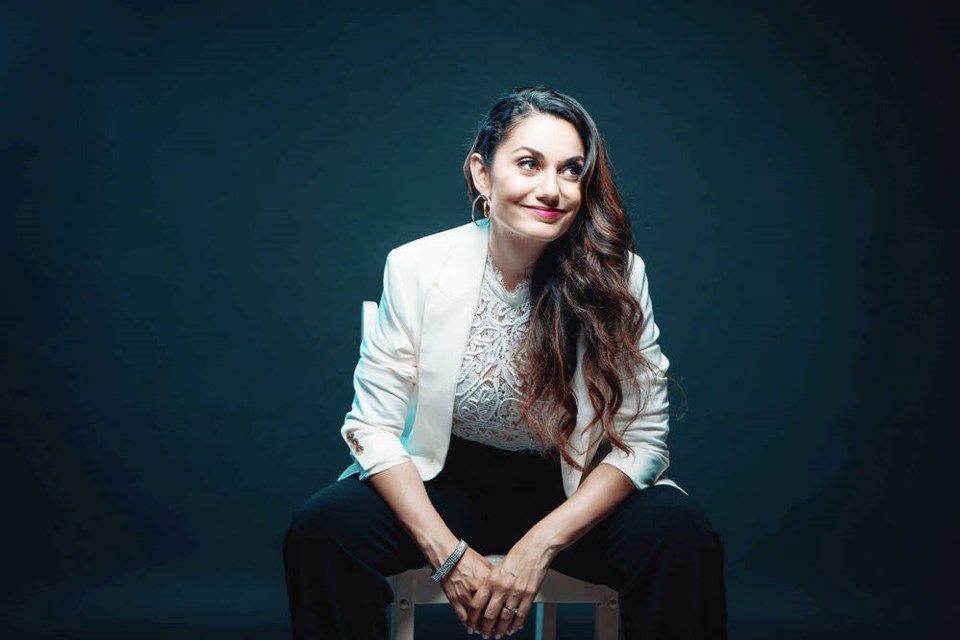AINADAMAR
Where: Royal Theatre, 805 Broughton St.
When: Feb. 21, 23, and 27 at 7:30 p.m.; Feb. 25 at 2:30 p.m.
Tickets: $30-$169 from the Royal McPherson box office (250-386-6121) or rmts.bc.ca
There is much to be digested — and discussed — when it comes to the topic of Ainadamar, the new Pacific Opera Victoria production. Buckle your seatbelts, because this is one heck of an unconventional ride.
Sung in Spanish with English surtitles, Ainadamar walks the audience through the entwined lives of queer poet and playwright Federico García Lorca and his muse, actress Margarita Xirgu. What is real? What’s imagined? That is a decision best left to the audience, according to Edmonton soprano Miriam Khalil, who plays Xirgu in four performances of Osvaldo Noé Golijov’s acclaimed 2003 opera next week at the Royal Theatre.
“It’s non-linear, but not everything is linear in life, especially memories,” Khalil said. “That’s what this is — it’s flashes of memories. And if you keep that in mind, you will see the bigger arch of the story.”
Ainadamar, with a libretto by American playwright David Henry Hwang, is a half-true tale that explores the complicated relationship between Xirgu, the beloved actress who was exiled from Spain in 1937, and García Lorca, who was killed by Spanish militia in 1936, under unclear circumstances (he is believed to have been killed near the well of Ainadamar, near his home city of Granada, hence the opera’s title.) The pair’s iconic 1927 collaboration, Mariana Pineda, which featured original sets painted by Salvador Dalí, provides much of the backbone for Ainadamar.
The opera is purposefully told and delivered in an easily digestible manner, and Khalil, who has a longstanding relationship with Pacific Opera Victoria, including a half-dozen full productions, staged readings and online performances, is perfectly cast. She won a Juno Award in 2019 for the album Ayre: Live, a song cycle by Ainadamar composer Golijov, which gave her a feel for how the contemporary Argentinian composer operates.
“The thing with the classics, we’ve heard them, and we understand the language, because it has influenced what we are listening to now. But I also think the language of composers we don’t know as well, like Golijov, are the ones which are going to challenge us to grow.”
Pacific Opera is the ideal company in that regard, she said. Its supporters have previously demonstrated they are open to the idea of being challenged, even with an opera told via flashbacks. That level of understanding helps when it comes to a production like Ainadamar as much of the story takes place in the mind and memory of Xirgu.
“He’s sort of a memory,” Khalil said of García Lorca, who makes appearances from the afterlife. “He has passed away, so it is through [chapters of] Margarita’s life that she remembers him.”
Ainadamar is a large-scale production, with many flavours, layers, and musical moving parts, including singers from the Victoria Children’s Choir, dancers from Victoria’s Alma de Espaňa Flamenco Dance Company, members of the Pacific Opera Chorus, and several flamenco musicians (the musical genre and Andalusian folklore in general was a big part of García Lorca’s creative life.) Giuseppe Pietraroia will conduct, with stage direction by Brian Staufenbiel.
The opera features U.K. mezzo-sporano Hanna Hipp in the role of García Lorca, a “trouser role” as it employs a female performer as a male character. The early form of cross-dressing is part of a long operatic tradition, and adds yet another layer of intrigue to an opera that combines real-life characters having quasi-fictional conversations.
Khalil, who lives in Edmonton and teaches in the music department at the University of Alberta, enjoyed the discovery part of her preparation, including learning more about the intertwined political and personal lives of García Lorca and Xirgu.
Along the way, she also discovered a unique parallel between Golijov’s life and her own. The composer, who currently lives in Massachusetts after immigrating to Israel from Romania in 1983, often references Arabic and Egyptian music in his compositions — both of which are part of Khalil’s own culture. She was born in Lebanon and raised in Syria, where she lived with her family before moving from Damascus to Ottawa in the 1990s, when she was seven years old.
She joined a choir shortly after arriving in Canada, which was her way of learning English and French, neither of which she could speak when she arrived. “Music was my way in,” she said. “I knew I had a voice, and that was my only way of showing that I was special at that age.”
Her later work — including the roles of Mimì in La Bohème, Donna Elvira in Don Giovanni, and Susanna in Le Nozze di Figaro — are duly impressive, particularly for someone who had not seen an opera until she sang in her first one the age of 18. Khalil was a first-year student at the University of Ottawa when she joined the chorus for a production of Francis Poulenc’s Dialogue of the Carmelites, kickstarting her career path.
“The community, the aspect of telling a story, but also using my voice in what was such a weird way for me, that was it,” she said.



